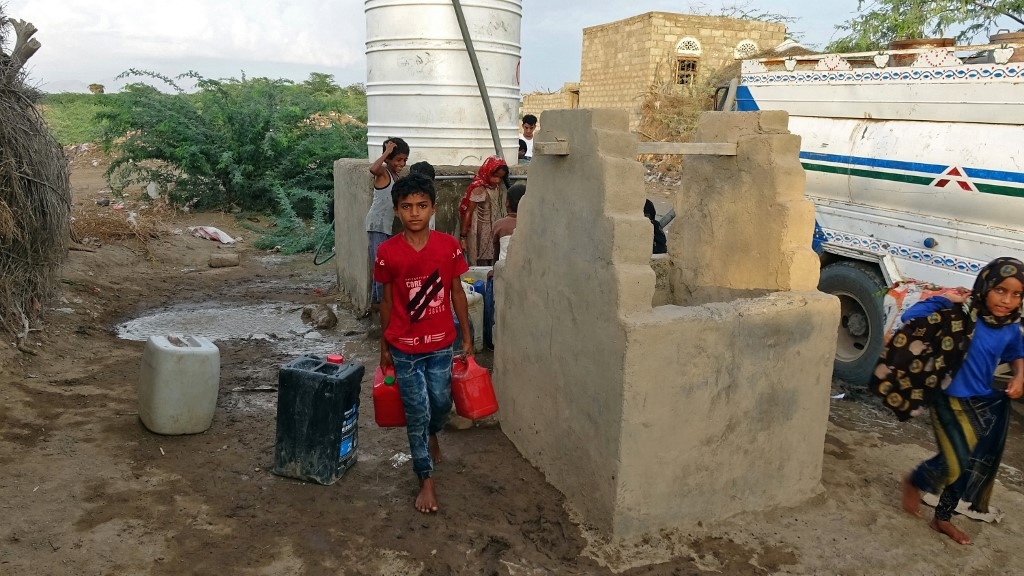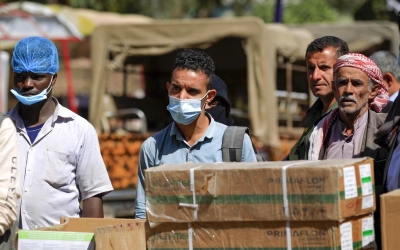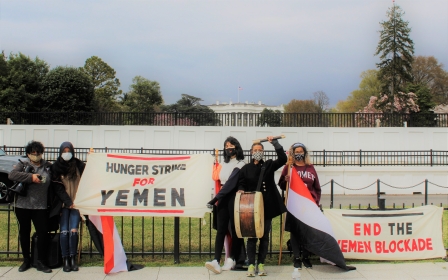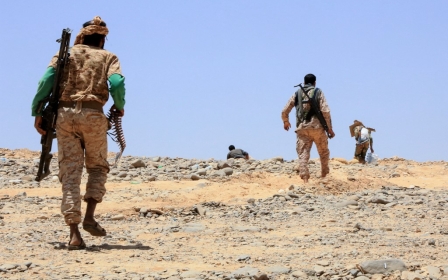US senators demand Saudi Arabia end its blockade starving Yemen

A group of Democratic senators have called on US President Joe Biden to take "immediate and decisive action" to pressure Saudi Arabia into lifting restrictions on imports to Yemen, which they say are exacerbating one of the world's worst humanitarian crises.
The senators, concerned that Riyadh's blockade has prevented food, medicine and other crucial supplies from entering the war-torn country, said it was time Saudi Arabia faced serious consequences.
"Immediate and decisive action must be taken… The United States has diplomatic and economic leverage to compel Saudi Arabia to end its callous blockade of Yemen and we must use it before more lives are needlessly lost," the senators said in a letter to Secretary of State Antony Blinken on Wednesday.
This was the third such letter to be sent to the Biden administration concerning the blockade since he took office in January.
New MEE newsletter: Jerusalem Dispatch
Sign up to get the latest insights and analysis on Israel-Palestine, alongside Turkey Unpacked and other MEE newsletters
Saudi Arabia and its regional allies, mainly the United Arab Emirates, entered the Yemeni government's war against the Houthi rebels in 2015, and began a wide-ranging aerial bombing campaign.
The coalition also introduced an air and naval blockade that it says is to prevent the Houthis from smuggling weapons into the country. But critics of Saudi Arabia's actions have long accused the kingdom of cutting off basic civilian goods.
While the White House has recently called on Saudi Arabia to ease some of its restrictions, the kingdom has not yet made any move to do so.
'Leverage all influence'
At least 16 Democrats, led by Senator Elizabeth Warren, a leading progressive within the party, signed Wednesday's letter demanding the Biden administration take more severe action on the issue.
The senators urged the Biden administration to "leverage all influence and tools available", including pending weapons sales, military cooperation, the provision of maintenance for air force planes and other equipment, as well as Washington's general diplomatic ties with the kingdom "to demand that Saudi Arabia immediately and unconditionally stop the use of blockade tactics".
The senators acknowledged the Biden administration's efforts to address the conflict in Yemen, including reversing the Trump administration's designation of the Houthi rebel group as a terrorist organisation, announcing an end to US support for Saudi-led "offensive" operations and resuming critical humanitarian assistance to northern Yemen.
Tim Lenderking, US special envoy for Yemen, this month urged Saudi Arabia to ease "all restrictions" on the port of Hodeidah and Sanaa airport. In addition to the restrictions being lifted, the State Department said it hoped to reach a comprehensive, nationwide ceasefire, and move to inclusive political talks.
'A leading driver of the suffering in Yemen... has been the air and sea blockade'
- Senators' letter
Still, the senators called on the White House to do more.
"These are welcome steps, but we must now address the serious harm caused by ongoing blockade tactics," the Senators said.
Last month, a spokesperson from the State Department sparked ire by telling Vox News that Riyafh's practices in Yemen were "not a blockade".
"Food is getting through, commodities are getting through, so it is not a blockade," the spokesperson said at the time.
Referencing that comment, the senators highlighted the ongoing shortages in Yemen.
"A leading driver of the suffering in Yemen, which has exacerbated all other existing issues, has been the air and sea blockade by the Saudi-led coalition," the senators stressed.
"While your Administration maintains that '[this] is not a blockade,' Saudi action is undoubtedly preventing much needed fuel from reaching those in need and is exacerbating an already grave humanitarian crisis; the United States must work to put an end to it," they said.
'Yemen has been neglected'
Wednesday's letter is just the latest effort to come out of Congress in recent weeks aimed at getting the White House to act on the situation.
Last month a bipartisan group of House Foreign Affairs Committee members sent a similar letter to Secretary Blinken, calling on the White House to pressure Saudi Arabia to stop the "outright blocking" of goods and humanitarian assistance into ports in Yemen, which they said had led to increased inflation, "economic collapse, and the failure of public services in Yemen".
"We understand that the conflict in Yemen is complex and affects broader political and security interests, but we nonetheless ask that you stress the need to remove import restrictions immediately on humanitarian grounds," the lawmakers wrote at the time.
"Ending this practice will boost Yemen's economy, de-escalate the conflict, and prevent this humanitarian catastrophe from worsening - all important U.S. objectives," the continued.
Not long before that, a group of 70 Democrats in the House had sent a letter to President Joe Biden calling on him to pressure Riyadh into ending its blockade on Yemen.
"Until recently, the blockade on Yemen has been neglected by Congress despite its catastrophic impact on civilians' lives in Yemen," Dr Shireen al-Adeimi, assistant professor at Michigan State University, said in a statement accompanying Wednesday's letter. "I'm glad to see that this is now shifting, and that U.S. elected officials are calling on President Biden to end his support for the blockade on Yemen. I also hope to see Congress take back its constitutional power by legislating an end to all U.S. involvement in the war on Yemen."
Dr Aisha Jumaan, president of Yemen Relief and Reconstruction Foundation, also commented on the senators' letter, saying that the blockade was "meant to starve civilians and destroy their livelihoods" while pushing 16.3 million people "into the brink of a man-made famine".
"We must lift the blockade immediately and unconditionally to prevent mass starvation and save lives. Conditioning lifting the blockade to protracted negotiations between warring parties is unethical as it holds civilians hostages and risks their lives. Yemen can't wait," Jumaan said.
The war has killed more than 230,000 people in Yemen, caused outbreaks of disease, and brought the country to the very brink of famine.
Middle East Eye delivers independent and unrivalled coverage and analysis of the Middle East, North Africa and beyond. To learn more about republishing this content and the associated fees, please fill out this form. More about MEE can be found here.





